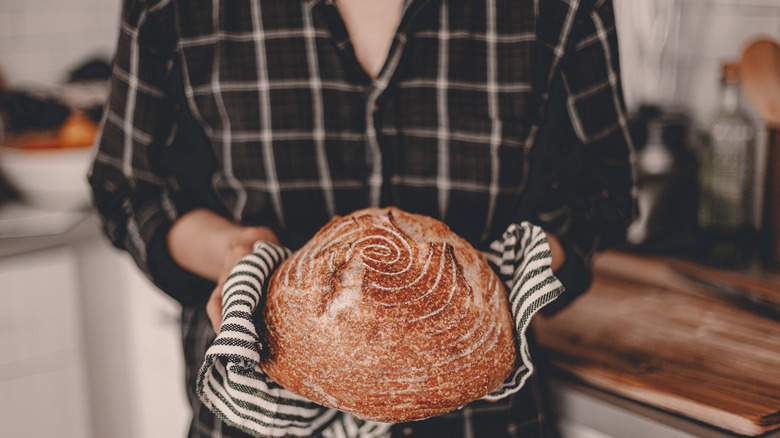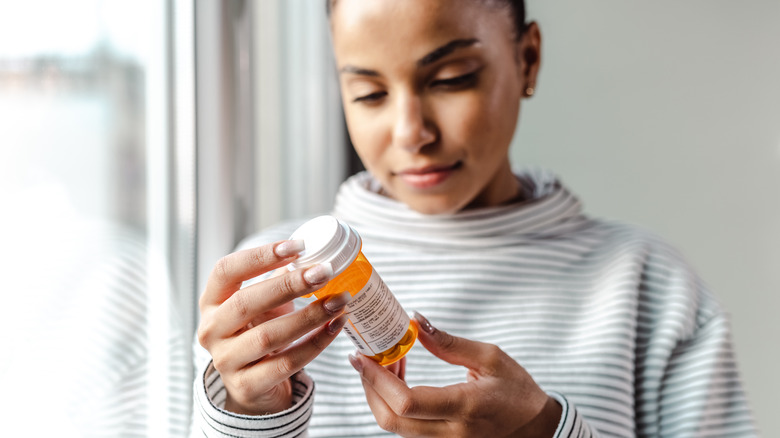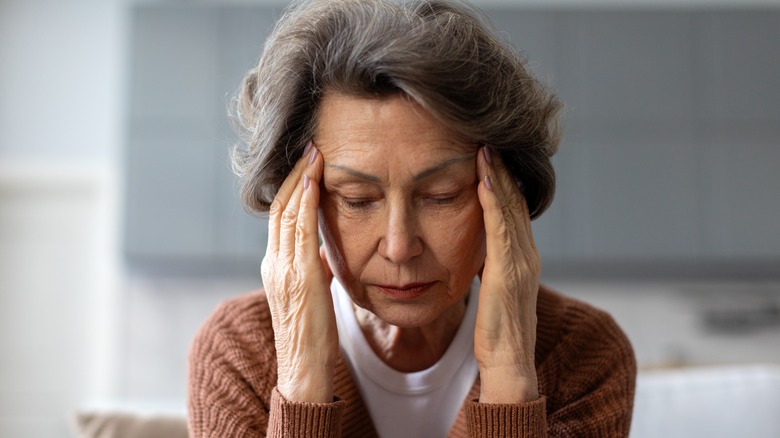Avoid Eating Sourdough Bread If You Take This Medication
Baking a fresh loaf of bread from scratch became a soothing pastime for many of us during the height of the COVID-19 pandemic. Viral videos of people baking — sourdough bread, in particular — took social media by storm. For some of us, this hobby has stuck around. However, whether you enjoy tending to your own sourdough starter or prefer picking up a hot boule from the bakery, some medications can negatively interact with specific compounds found in sourdough bread.
While sourdough bread certainly has its health benefits, people who take monoamine oxidase inhibitors (MAOIs) will want to avoid it altogether, Mayo Clinic experts warn. Prescribed as depression treatment drugs, MAOIs work by blocking the activity of an enzyme in the body known as monoamine oxidase. This enzyme is responsible for breaking down serotonin, dopamine, and norepinephrine — all of which are neurotransmitters that influence mood (per StatPearls). By hindering this breakdown function, MAOIs allow for levels of these neurotransmitters to remain high, thereby treating symptoms of depression.
Another compound that the monoamine oxidase enzyme targets is tyramine, an amino acid that helps us maintain healthy blood pressure levels. Just like with serotonin, dopamine, and norepinephrine, MAOIs block the breakdown of tyramine, resulting in increased levels of the amino acid within the body. Because of this, we don't want to add more tyramine to the equation through food sources like sourdough bread.
Sourdough bread can increase tyramine when taking an MAOI
Research has shown that patients taking MAOIs who also consume tyramine through dietary sources will often present with high tyramine levels (per StatPearls). Such high levels of the amino acid in the body can cause what's known as the tyramine pressor response, characterized by an abrupt spike in blood pressure. Although uncommon, this response can be fatal if it prompts bleeding within the brain.
Foods rich in tyramine include processed meats, turkey, sausage, avocados, bananas, cheese, broad beans, and yes, sourdough bread (per Mayo Clinic). While the natural tyramine levels in these foods are minimal to start with, tyramine content increases as these foods age and ripen, and unfortunately, cooking won't do any good to minimize these amounts. In addition to avoiding tyramine-rich foods that have been hanging out in the kitchen for weeks, experts encourage individuals taking MAOIs to avoid foods prepared even just hours earlier in the day. In other words, patients will want to eat immediately after their food has been cooked. Even after tapering off your antidepressant medication, individuals taking MAOIs will still want to steer clear of sourdough bread for two weeks after the fact as the drug works its way out of their system.
Signs of a hypertensive crisis
MAOIs aren't as readily prescribed nowadays as they once were. Since they originally emerged in the 1950s (per StatPearls), selective serotonin reuptake inhibitors (SSRIs), serotonin/norepinephrine reuptake inhibitors (SNRIs), and other types of antidepressants have come on the scene (per Cleveland Clinic). These are considered safer first-line treatment options for depression and other mood disorders due to the fact that MAOIs are associated with a number of potentially serious adverse reactions. For this reason, these medications are often implemented as a last resort if the patient has had no improvements with any other drug interventions.
Medically known as a hypertensive crisis, the dangerous spike in blood pressure due to excess levels of tyramine in the body may produce symptoms such as chest pain, severe headache, rapid heartbeat, nausea, vision changes, and shortness of breath. In the event that a person experiences these symptoms, they should seek urgent medical help. While sourdough bread is best avoided in people taking MAOIs, Healthline explains that grain-based breads are considered a low-tyramine alternative.



